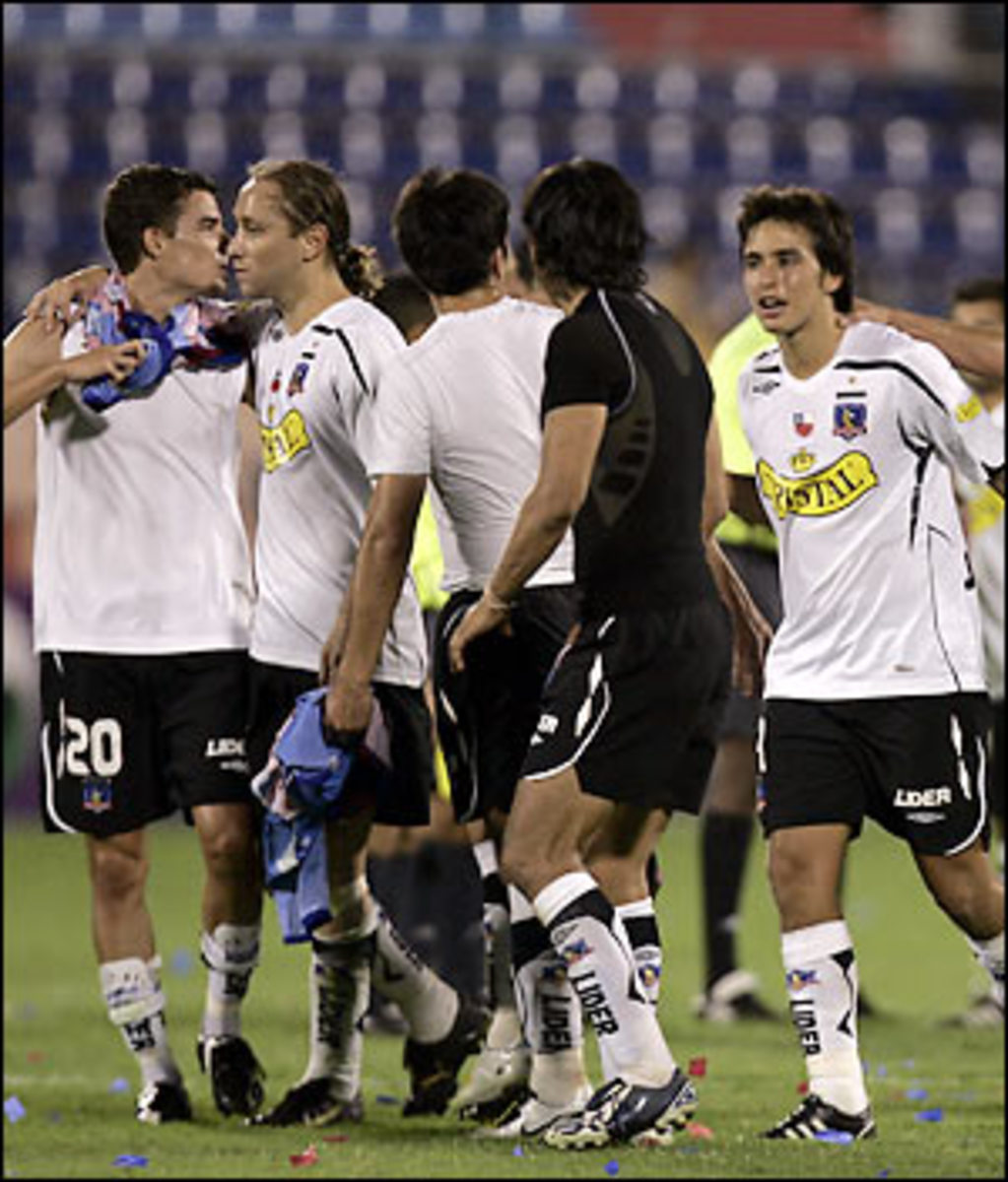Red hot in Chile
Most American fans probably know little -- if anything -- about Colo-Colo. But when it comes to Chilean soccer, the club is like Real Madrid, Manchester United and Bayern Munich rolled into one.
For years, Los Albos have dominated the domestic scene, and their recent resurgence has translated into four successive league titles. Colo-Colo has won a record 27 Chilean championships, 15 more than archrival Universidad de Chile.
It's traditionally the club that plays the most attractive style of soccer in the country, and unless things change dramatically in the coming years, there's no reason why its domination shouldn't continue.
Politics and soccer go hand in hand all over the world. In Santiago it's no different: Much of Colo-Colo's success over the years is thanks to former Chilean dictator Augusto Pinochet. The controversial political figure -- responsible for the deaths of more than 3,000 people during his rule -- was named Colo-Colo's honorary president after the 1973 military coup.
Pinochet had very close ties with the club, and its management, having financed it in times of need, such as when it was on the brink of bankruptcy during the mid-'70s.
But once you get past the politics, Colo-Colo's achievements on the soccer field set it apart. What has given the club the edge over other Chilean teams is that it's the only one to have won South America's ultimate prize, the Copa Libertadores. However, since its historic triumph against Olimpia of Paraguay in '91, it has found international titles hard to come by.
Like the majority of the South American giants outside the Argentina and Brazil monopoly, Colo-Colo has struggled to find consistency in the Libertadores. Last year it topped a difficult group, but bowed out at the round of 16, its best finish in eight years.
In '06, Colo-Colo had a great opportunity to win an international trophy when it reached the final of the Copa Sudamericana. It came into the finals series as the clear favorite, and held Pachuca to a 1-1 draw in the first leg in Mexico. But then it suffered a devastating 2-1 defeat in Santiago that handed the title to the Mexicans.
That defeat was a huge setback and led to a massive exodus of its key players -- namely Matías Fernández, Humberto Suazo and Alexis Sánchez, who were without doubt amongst the most talented generation of players the club had seen in a number of years.
Since then, Colo-Colo has been in the rebuilding process. It has a combination of youth and experience in its current squad, and after some mixing and matching, Argentine coach Claudio Borghi has finally found the ideal blend. Much has been expected of his latest crop of stars, and it seems that all of the club's hard work is finally paying off in its current Libertadores campaign.
Los Albos may have started off the competition with a humiliating 3-0 defeat against Atlas in Guadalajara, but since then they have become a formidable unit. In its next group match, Colo-Colo picked up a crucial 3-1 victory over UA Maracaibo in Venezuela, and then proved its efficiency with a remarkable 2-0 victory over Boca Juniors last week.
Colo-Colo completely dominated the defending South American champions, recording one of its greatest victories in years. After 19-year-old midfielder Cristóbal Jorquera blasted them in the lead in the 2nd minute, the Chileans pressed for a second, which came 10 minutes before the break on a header from experienced Uruguayan striker Gustavo Biscayzacú.
But Borghi's side didn't sit back on its lead; it continued to pressure Boca. They nearly extended their lead in the 74th minute, had Gonzalo Fierro converted a penalty kick.
What really proved Colo-Colo's superiority was the fact that it kept on attacking and created enough scoring opportunities to have won the match by a much larger margin. It was no wonder the 45,000 capacity crowd at the Monumental stadium (a venue also financed by the late Pinochet) erupted after the final whistle.
Still, Colo-Colo will have to be in top form in its remaining three group matches if it wants to advance to the next stage of the competition. It currently sits in second position of Group 3, one point behind group leaders Atlas and two points in front of third-place Boca Juniors. It will have to overpower one of these two clubs for a spot in the following round.
For that reason, it's essential for Colo-Colo to pick up a positive result when it meets Boca Juniors at the Bombonera on Thursday night. It won't be an easy assignment by any means, but if Borghi's side picks up a valuable point, it will put it in a commanding position to reach the knockout stage.
But the odds are against them. Boca is undefeated at home in its last 22 Libertadores matches and is desperate for the three points. To make matters worse for Colo-Colo, its squad has protested against unpaid bonuses by refusing to train, and Borghi has announced he'll make good on his threat to step down after the Boca match.
The only thing that might help Colo-Colo's cause in Buenos Aires will be the absence of Boca playmaker Juan Román Riquelme, who picked up an injury in Santiago last week. Still, it will be a difficult task, and if the Chileans don't return home with anything to show, its clash with Atlas in Santiago in late April should determine its fate.
Colo-Colo may rule its own league, but the Copa Libertadores has been a different story. The Chileans have struggled in every recent edition of the competition, and although they have worked hard to get things right for their current campaign, the quality of their group opponents has meant reaching the next round is that much harder.
That in itself will be a huge challenge.






